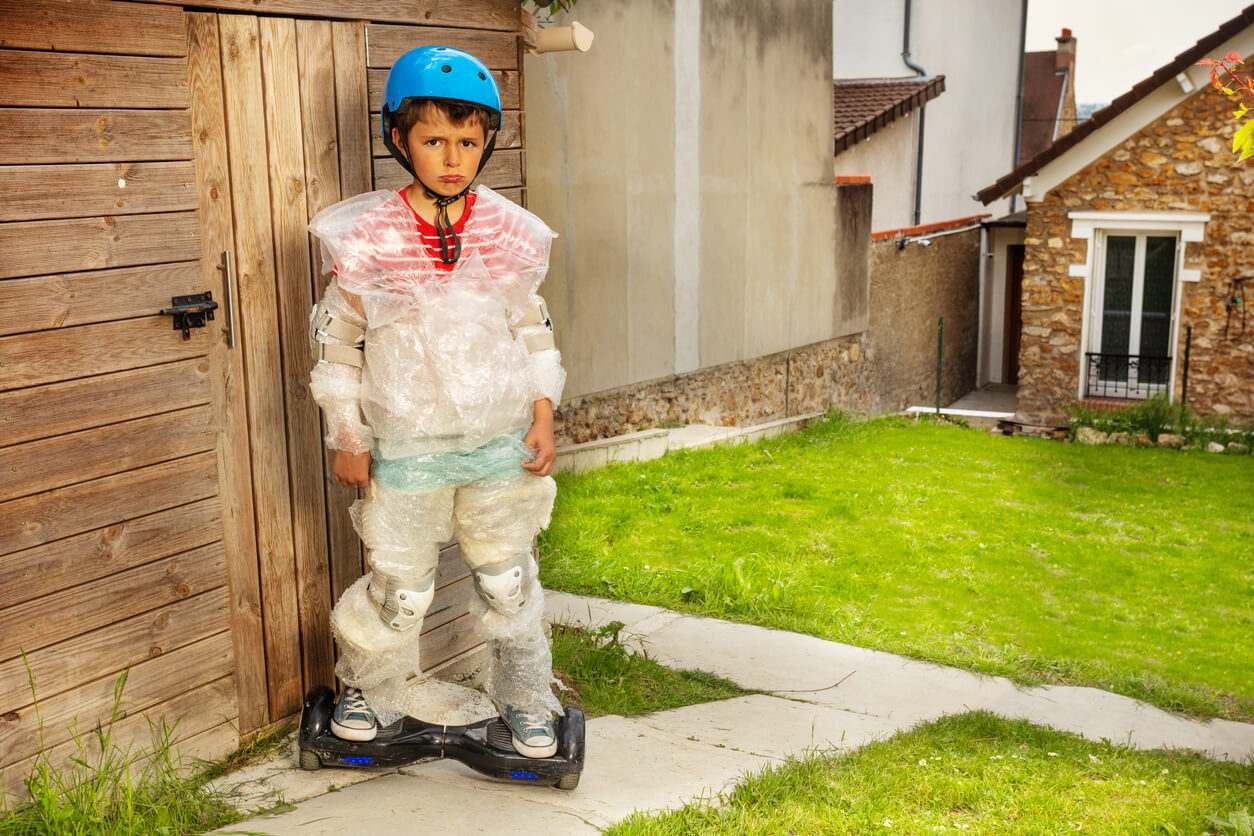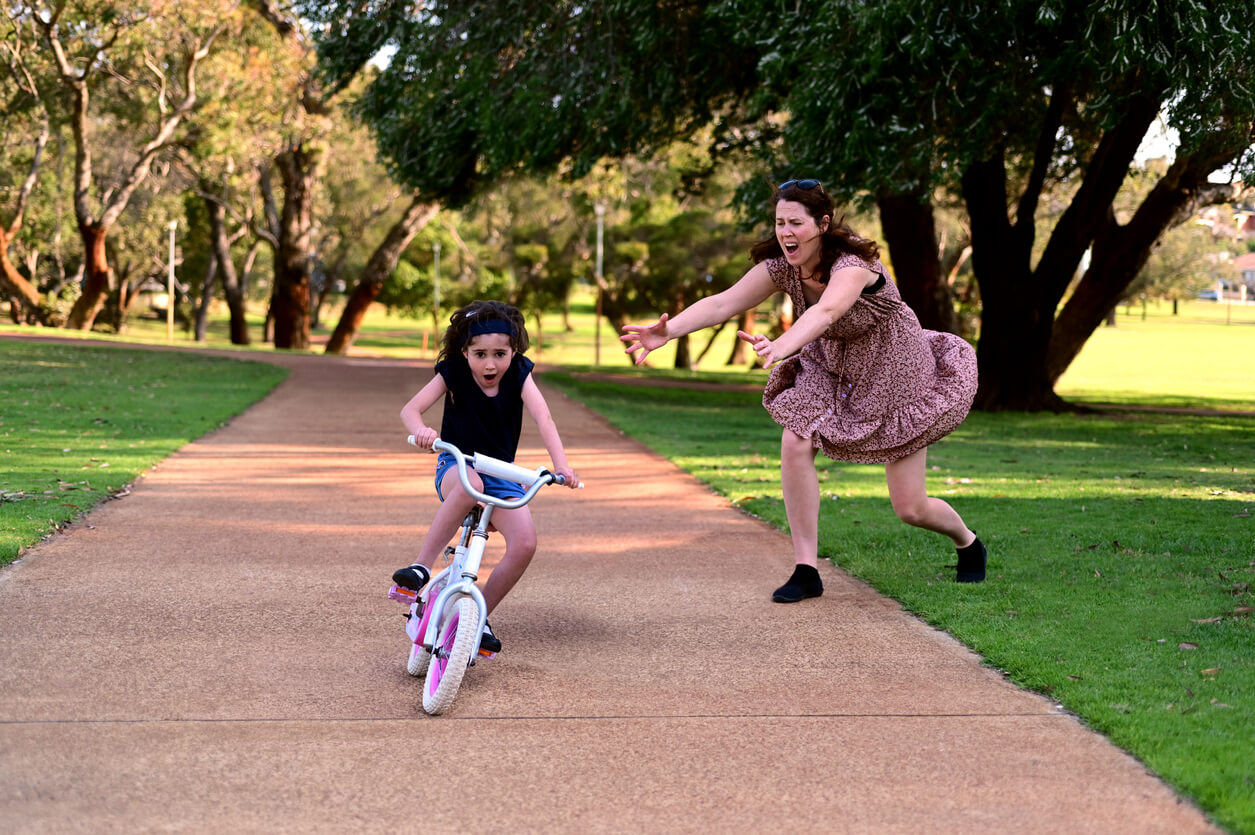5 Recommendations for Overprotective Mothers


Written and verified by the psychologist Mara Amor López
As parents, we worry about the dangers our children may encounter throughout their lives. But the desire to keep them away from any kind of risk leads to overprotection. This, beyond the good intentions behind it, is quite negative for the development of autonomy. So, if you consider yourself to be one of those overprotective mothers, we’re going to give you some recommendations.
Overprotection can end up in an obsession and limit the child’s contact with the outside world. In the end, the child grows up in a bubble that doesn’t allow them to be fully aware of the reality around them. This favors the feeling of inability to face challenges and a considerable damage to self-esteem.
If you want to know some recommendations for overprotective mothers, don’t miss this interesting article.
A child who grows up under overprotection will grow up with fear and insecurities, which will negatively affect their present and future.
What are the characteristics of overprotective mothers?
The main characteristic of overprotective mothers is that they worry excessively about their children’s safety. It should be clear that they don’t do it maliciously, but the other way around. Their eagerness to protect their children makes them behave in this way and their main objective is to prevent them from suffering or going through a situation that could harm them.
What happens is that this ends up becoming a problem and instead of helping the child, it harms them even more. Exaggerated care actions create barriers or boundaries to prevent your children from taking risks, even if there’s no concrete danger outside of these. This limits the development of the child’s autonomy and feeds the self-perception of an inability to cope with adversity.

How do overprotective mothers behave?
Below, we’ll look at some behaviors that characterize the actions of overprotective mothers:
- They prevent their children from being independent and do things for them.
- They justify any mistake their children make.
- They don’t allow their children to acquire responsibilities.
- They spoil their children excessively.
- They refuse to let their children participate in activities or play in natural surroundings.
- They produce fear, uncertainty, and confusion in their children with their messages and they remind them that there are things they’re not capable of doing on their own.
- They always solve the problems that happen to their children, without allowing them to solve them themselves.
Recommendations for overprotective mothers
Now that you know the negative traits of overprotection, learn how to overcome your fears and insecurities so as not to cause harm to your little ones.
1. Understand that this overprotective behavior isn’t good for you or your child
When you become aware of the negative aspects of certain behavior, it’s easier to recognize that you’re not doing it right and find a solution to the problem.
2. Develop their self-confidence
This eagerness to overprotect your children arises from the distrust, fear, and insecurities that mothers may feel as children discover the world.
It’s very common for parents who overprotect to have been raised under the same style, so it’s very important to work on your own self-confidence in order not to transfer insecurities to the children.
3. Allow your children to do things for themselves
Parents shouldn’t do anything that children are already capable of doing. For example, when they’re able to dress themselves, let them do it on their own, even if they put their shirt on inside out. Once the work is finished, you can put it on properly.
It’s essential to let them gain autonomy and do what they’re ready to do. Logically, those things that are appropriate for their age and with which they can’t hurt themselves.
4. Trust in their abilities
Depending on their chronological age, children are capable of doing certain things. We have to trust in them, in their abilities, and let them try. Things may go wrong, but we must allow them to make mistakes. Avoid phrases such as “you can’t do that”, “let me do it”, and “you take too long, I’d better do it”.
Limit your interventions to supervising the activities or tasks when your child carries them out and motivate them to keep trying until they achieve their goal.

5. Help only when necessary
Parents should be their children’s guides who accompany and support them. Therefore, it’s important to allow them to make their own mistakes so they can learn from them and become independent and autonomous. This learning is key to their well-being. So, give help only when necessary, but not before they ask for it.
You may be interested in: Teaching Children The Value of Perseverance
If you’re an overprotective mother, propose a change
Maybe you’re not among the overprotective mothers, but you know someone who is. In any case, it’s essential to try to change this habit as soon as possible, for the good of the child and their close environment.
Maybe you’re an overprotective mother and you haven’t realized that you’re unintentionally harming your child. Therefore, we hope that these suggestions can help you to improve these behaviors.
Everything can be changed, with effort, motivation, and desire.
As parents, we worry about the dangers our children may encounter throughout their lives. But the desire to keep them away from any kind of risk leads to overprotection. This, beyond the good intentions behind it, is quite negative for the development of autonomy. So, if you consider yourself to be one of those overprotective mothers, we’re going to give you some recommendations.
Overprotection can end up in an obsession and limit the child’s contact with the outside world. In the end, the child grows up in a bubble that doesn’t allow them to be fully aware of the reality around them. This favors the feeling of inability to face challenges and a considerable damage to self-esteem.
If you want to know some recommendations for overprotective mothers, don’t miss this interesting article.
A child who grows up under overprotection will grow up with fear and insecurities, which will negatively affect their present and future.
What are the characteristics of overprotective mothers?
The main characteristic of overprotective mothers is that they worry excessively about their children’s safety. It should be clear that they don’t do it maliciously, but the other way around. Their eagerness to protect their children makes them behave in this way and their main objective is to prevent them from suffering or going through a situation that could harm them.
What happens is that this ends up becoming a problem and instead of helping the child, it harms them even more. Exaggerated care actions create barriers or boundaries to prevent your children from taking risks, even if there’s no concrete danger outside of these. This limits the development of the child’s autonomy and feeds the self-perception of an inability to cope with adversity.

How do overprotective mothers behave?
Below, we’ll look at some behaviors that characterize the actions of overprotective mothers:
- They prevent their children from being independent and do things for them.
- They justify any mistake their children make.
- They don’t allow their children to acquire responsibilities.
- They spoil their children excessively.
- They refuse to let their children participate in activities or play in natural surroundings.
- They produce fear, uncertainty, and confusion in their children with their messages and they remind them that there are things they’re not capable of doing on their own.
- They always solve the problems that happen to their children, without allowing them to solve them themselves.
Recommendations for overprotective mothers
Now that you know the negative traits of overprotection, learn how to overcome your fears and insecurities so as not to cause harm to your little ones.
1. Understand that this overprotective behavior isn’t good for you or your child
When you become aware of the negative aspects of certain behavior, it’s easier to recognize that you’re not doing it right and find a solution to the problem.
2. Develop their self-confidence
This eagerness to overprotect your children arises from the distrust, fear, and insecurities that mothers may feel as children discover the world.
It’s very common for parents who overprotect to have been raised under the same style, so it’s very important to work on your own self-confidence in order not to transfer insecurities to the children.
3. Allow your children to do things for themselves
Parents shouldn’t do anything that children are already capable of doing. For example, when they’re able to dress themselves, let them do it on their own, even if they put their shirt on inside out. Once the work is finished, you can put it on properly.
It’s essential to let them gain autonomy and do what they’re ready to do. Logically, those things that are appropriate for their age and with which they can’t hurt themselves.
4. Trust in their abilities
Depending on their chronological age, children are capable of doing certain things. We have to trust in them, in their abilities, and let them try. Things may go wrong, but we must allow them to make mistakes. Avoid phrases such as “you can’t do that”, “let me do it”, and “you take too long, I’d better do it”.
Limit your interventions to supervising the activities or tasks when your child carries them out and motivate them to keep trying until they achieve their goal.

5. Help only when necessary
Parents should be their children’s guides who accompany and support them. Therefore, it’s important to allow them to make their own mistakes so they can learn from them and become independent and autonomous. This learning is key to their well-being. So, give help only when necessary, but not before they ask for it.
You may be interested in: Teaching Children The Value of Perseverance
If you’re an overprotective mother, propose a change
Maybe you’re not among the overprotective mothers, but you know someone who is. In any case, it’s essential to try to change this habit as soon as possible, for the good of the child and their close environment.
Maybe you’re an overprotective mother and you haven’t realized that you’re unintentionally harming your child. Therefore, we hope that these suggestions can help you to improve these behaviors.
Everything can be changed, with effort, motivation, and desire.
All cited sources were thoroughly reviewed by our team to ensure their quality, reliability, currency, and validity. The bibliography of this article was considered reliable and of academic or scientific accuracy.
- Ballesteros-Moscosio, M. Á. (2017). Padres y madres sobreprotectores: el reto de la escuela y los docentes. Diálogo: Familia Colegio, 328, 22-28. En internet: https://scholar.googleusercontent.com/scholar?q=cache:WlRxcbUB0HYJ:scholar.google.com/&hl=es&as_sdt=0,5&as_vis=1
- Gutierrez Coronel, S. (2018). La sobreprotección de los padres en el desarrollo social en la institución de los niños y niñas de tres a cinco años de edad. En internet: http://repositorio.untumbes.edu.pe/handle/20.500.12874/974
- Olivos Julón, D. M., & Urtecho Ruíz, E. C. (2020). La sobreprotección familiar en edad escolar.
- Vásquez Monzón, M. A. (2007). La sobreprotección materna y su incidencia en el bajo rendimiento escolar en niños y niñas comprendidos entre las edades de 6 a 12 años (Doctoral dissertation, Universidad de San Carlos de Guatemala). En internet: http://www.repositorio.usac.edu.gt/14497/
This text is provided for informational purposes only and does not replace consultation with a professional. If in doubt, consult your specialist.








